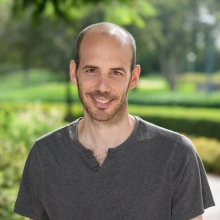Shedding light on the epigenome
New scientists

As scientists grapple with new theories as to how cells and organisms precisely take shape, Dr. Yonatan Stelzer is keen to investigate how environmental factors might influence the inner workings of the genome— offering new trajectories for evolution and inheritance.
To explore the impact of these factors, Dr. Stelzer realized he would need to overcome a variety of technical roadblocks that stood in his way. Most problematic, he found, was the dynamic, elusive nature of epigenetics—the study of potentially heritable modifications in gene activity that do not alter an individual’s DNA sequence. While particularly dynamic during early cell fate determination and early development, epigenetic changes also commonly occur in the case of certain diseases like cancer.
Despite the critical impact of this phenomenon, scientists have thus far largely struggled with modeling epigenetic changes, only able to take static snapshots of a relevant cell at a given state, according to Dr. Stelzer. Such snapshots, however, fail to present an optimal picture due to the dynamic nature of epigenetic changes and their cell-tocell variability, he says. To help overcome these challenges, Dr. Stelzer developed an innovative, region-specific reporting system during his postdoctoral fellowship at MIT’s Whitehead Institute.
His reporting system, featured in Cell in 2015, enables researchers to shed light on the DNA modification status of a specific genomic region. He focused on a particular type of epigenetic mechanism, called DNA methylation and demethylation, in which methyl groups are added to or subtracted from DNA molecules, silencing and awakening gene expression. DNA methylation is essential to mammalian development, in functions like maintaining the inactive X chromosomes in females, regulating parental imprinting, and silencing of mobile elements in the genome. The process can go awry, however, during the development of cancer and other diseases.
To implement his reporting system, Dr. Stelzer first identified a gene “promoter”— the unit that begins transcribing genes and their RNA—that would be uniquely sensitive to the DNA methylation process. Using this tool, Dr. Stelzer was able to mirror methylation processes within the promoter, which he linked to a fluorescent marker. A green light indicated that methylation was removed, while darkness demonstrated that it was added.
Among the wide range of potential applications may be the detection of epigenetic changes in cancer. For example, if an early event of problematic demethylation occurs, a reporter could expose the cells undergoing the epigenetic event and enable researchers to screen for therapies that could revert the process.
Dr. Stelzer remains most interested in the fundamental processes associated with epigenetic regulation of cell fate and development: how such circumstances influence some traits, silence others, control certain mobile elements in the genome, and regulate parental imprinting. And he wants to know how environmental influences like famine, diet, aging, and other stress factors could all potentially impact the human genome.
Born on a moshav in the north of Israel, Dr. Yonatan Stelzer earned his BSc, MSc and PhD in less than seven years, publishing three first-author journal articles by the end of his undergraduate degree. Dr. Stelzer completed his BSc in life sciences and chemistry in 2011 at the Hebrew University in Jerusalem, where he began conducting research under the supervision of Prof. Nissim Benvenisty during his second semester at the Givat Ram campus. He continued working in the same laboratory during his graduate studies, receiving his MSc and PhD from the Department of Genetics in 2012 and 2014 respectively. Dr. Stelzer then became a postdoctoral fellow at the Massachusetts Institute of Technology’s Whitehead Institute.
During his graduate studies, Dr. Stelzer earned a Clore Foundation Scholarship for excellent PhD students and was honored by the Hebrew University with multiple outstanding teacher awards. He also earned the Hans Wiener Prize for his PhD dissertation, which focused on parental imprinting in human pluripotent stem cells. When not focusing on genetics and epigenetics, Dr. Stelzer has long been active in his local community, volunteering with high-risk Israeli youth and critically ill Palestinian children.
Dr. Stelzer is supported by the Benoziyo Fund for the Advancement of Science, the Helen and Martin Kimmel Institute for Stem Cell Research, and the Jean-Jacques Brunschwig Fund for the Molecular Genetics of Cancer.








